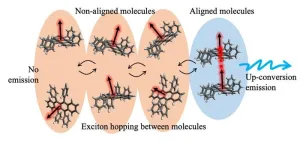(Press-News.org) A first of its kind study by Cancer Research UK reveals premature cancer death rates in 35–69-year-olds fell by more than a third over 25 years
Improvements in the UK are a result of smokefree policies, prevention measures, early detection programmes like cancer screening, and more effective treatment options
But the study paints a mixed picture with cancer cases on the rise and cancer mortality rates still too high
The charity’s manifesto, ‘Longer, better lives’ outlines action the UK Government can take to save 20,000 lives from cancer every year by 2040
A study by Cancer Research UK has revealed that fewer middle-aged people are dying from cancer in the UK than at any point over the last 25 years. *
Published in the British Medical Journal and conducted by researchers at the University of Leeds, University College London and Public Health Scotland, this major study examines trends in cancer incidence and mortality amongst middle-aged adults (35-69 yrs.) in the UK between 1993 to 2018. Researchers said that analysing trends in this age group helps to indicate future patterns of cancer in older patients.
The study showed that overall, mortality rates had dropped by 37% in men and by 33% in women. In examining data for 23 cancer types, it also found that cervical cancer mortality rates decreased by 54.3%. This shows how the HPV vaccine combined with cervical screening has helped to prevent cancer and stop the disease in its tracks.
The study also revealed that lung cancer mortality rates decreased by 53.2% in men and by 20.7% in women, thanks to reduced smoking rates in recent decades. And deaths have also dropped in breast, bowel and cervical cancers, showing how screening programmes help to save lives by diagnosing cancer earlier.
Whilst progress is to be welcomed, the charity warned that cancer cases are on the rise overall – this is largely due to a growing population and lifestyle factors impacting people’s cancer risk. The data highlights that cancer cases rose by 57% in men and 48% in women over the 25 years. This trend will result in challenges for cancer patients, the UK’s health system and the economy.
Researchers also found year-on-year increases in cases of melanoma, liver, oral and kidney cancers. And death rates for liver, oral and uterine cancers - all linked to risk factors including UV exposure, alcohol, overweight and obesity, and smoking - are not improving fast enough.
Cancer Research UK said there is an immense challenge ahead to maintain progress, with cancer waiting times hitting record highs in all UK nations and NHS staff under extreme pressure.
Cancer Research UK’s head of cancer intelligence and lead author of the study, Jon Shelton, said:
“This study helps us to see the progress we’ve made in beating cancer and where challenges clearly remain. With cancer cases on the rise and improvements in survival slowing, it’s vital that the UK Government takes bold action to keep momentum up. Now is the time to go further and faster, building on the successes of decades of research and improvements in healthcare.
“This research is as a useful benchmarking tool for the next 25 years and beyond so that we can take action to save more lives from cancer. We must continue to prevent as many cancer cases as possible, diagnose cancers sooner and develop kinder treatments.”
The charity said that the findings highlight where the UK Government can focus its efforts to help to save more lives from cancer, as well as the steps people can take to reduce their risk of the disease.
If action is taken against smoking, overweight and obesity and alcohol, nearly 37,000 cancer cases could be prevented by 2040 in the UK. Preventing ill health not only benefits cancer patients and their families, it also leads to huge gains for the economy and the NHS. **
Cancer Research UK is also calling on the Government to diagnose more cancers earlier. Bowel cancer screening should be optimised to reduce inequalities in access and reach as many eligible people as possible. Targeted lung screening, which is being rolled out across England, will help to save lives more lives from a cancer type that takes more lives than any other. It is vital that other UK nations follow suit to reach more at-risk people.
Cancer Research UK’s chief executive, Michelle Mitchell, said:
“This major study brings to life improvements that have been made to tackle cancer in recent decades. If we take lung cancer, for example, we can clearly see that reducing smoking prevalence saves lives. The UK Government can build on this success by raising the age of sale of tobacco and continuing to fund a world-leading programme of measures to help people who smoke quit.
“But cancer is still a defining health issue in the UK that impacts nearly one in two people. People face long waits for vital tests and treatment and cancer cases are on the rise. Cancer patients won’t feel the full benefits of advances in research breakthroughs and innovation, including new cancer treatments, without a long-term plan and funding from the UK Government.”
Cancer Research UK is urging political leaders to deliver long-term cancer strategies in all UK nations, including a National Cancer Council in England to drive cross-government action on cancer.
The UK Government must invest in new technologies and treatments for patients and innovation and reform must be backed by sufficient funding, staff, and equipment.
ENDS
Expert spokespeople are available for interview. For media enquiries, contact Anna Cawdron in the Cancer Research UK press office on anna.cawdron@cancer.org.uk, 020 3469 8928 or, out of hours, on 020 3469 8301.
Notes to editor
* Embargoed link to research: http://press.psprings.co.uk/bmj/march/cancer.pdf
Public link in British Medical Journal once embargo lifts: https://www.bmj.com/content/384/bmj-2023-076962
Cancer Research UK worked on the study with researchers at the University of Leeds, University College London and Public Health Scotland.
** Longer, better lives: A manifesto for cancer research and care (cancerresearchuk.org) p.13
Cancer Research UK has identified a research funding gap of more than £1bn for in the next decade, putting our world leading research at risk. If action isn’t taken, progress in cancer survival will continue to stall.
This study adds to a growing body of evidence that highlights challenges in the UK’s health system. Recently published research by Cancer Research UK includes:
'Cancer in the UK: 2024’ report - highlights that the rate of progress in cancer survival has slowed considerably in recent decades
International Cancer Benchmarking Partnership (ICBP) studies on treatment – reveals that the UK’s use of chemotherapy and radiotherapy lags behind comparable countries
Progress and challenges – preventable risk factors captured in the research
Preventable cancer risk-factor
Risk factor for
Key findings from the study*
What Cancer Research UK is calling for to further reduce cancer mortality
Tobacco
Causes at least 15 different types of cancer: lung, larynx, oesophagus, oral cavity, nasopharynx, pharynx, bladder, pancreas, kidney, liver, stomach, bowel, cervix, leukaemia, and ovarian cancers
The lung cancer mortality rate has decreased per year by 3.1% in men and 0.6% in women. This can be linked to reduced smoking rates over the 25 years.
Cancer Research UK urges the UK Government to:
Push through the smoking age of sale legislation to protect future generations from ever becoming addicted to tobacco.
Continue to fully and sustainably fund smoking cessation programmes to help people quit smoking for good
Roll out lung screening across all UK nations for earlier detection and reduce inequalities in access
Infections, such as HPV (human papillomavirus) and H.Pylori
Causes 13 types of cancer: Nose and sinuses, mouth, throat, liver, stomach, cervix, vagina, vulva, anus, penis, Hodgkin lymphoma, non-Hodgkin lymphoma, Kaposi sarcoma
The cervical cancer mortality rate has decreased per year by 3.6%. This shows the impact of the HPV vaccine combined with cervical screening in helping to prevent cancer and stop the disease in its tracks.
Cancer Research UK supports NHS England’s pledge to eliminate cervical cancer by 2030, but this ambition will only be possible if the vaccination and screening programmes are backed by sufficient resource and modern IT infrastructure. There must be targeted action to increase HPV vaccination coverage and reduce barriers to cervical screening.
UV exposure
Melanoma skin cancer
Melanoma skin cancer incidence rose per year by 4.2% in men and by 3.5% in women. There are various factors at play behind this increase, including more exposure to too much UV radiation, a rising population, and more people getting their skin checked.
Funding for health messaging campaigns that encourage people to stay safe in the sun, seek shade, cover up and apply sunscreen regularly.
Alcohol
Causes 7 cancer types: mouth, upper throat, larynx, oesophagus, breast, liver bowel
Rates of oral and liver cancer increasing at an alarming proportion.
Liver cancer incidence rose per year by 4.7% in men and by 3.9% in women.
UK Government should introduce restrictions on alcohol marketing to protect children and vulnerable people.
Overweight and obesity
Causes 13 types of cancer: oesophageal, stomach, bowel, liver, pancreatic, gallbladder, breast, uterus, ovary, kidney, thyroid, myeloma, and meningioma
Proportion of overweight and obesity increasing. Worring increases for liver and kidney cancers linked to overweight and obesity.
Kidney cancer incidence rose per year by 2.7% in men and by 2.9% in women.
UK Government should implement 2022 legislation on TV and online advertising restrictions on high fat salt and sugar foods.
* Age-standardised mortality rate for males and females aged 35-69 years, between 1993-2018 in the UK
END
Cancer deaths plummet in middle-aged people
A study by Cancer Research UK has revealed that fewer middle-aged people are dying from cancer in the UK than at any point over the last 25 years
2024-03-14
ELSE PRESS RELEASES FROM THIS DATE:
How to upcycle low-energy light
2024-03-14
To combine two low-energy photons into one high-energy photon efficiently, the energy must be able to hop freely, but not too quickly, between randomly oriented molecules of a solid. This Kobe University discovery provides a much-needed design guideline for developing materials for more efficient PV cells, displays, or even anti-cancer therapies.
Light of different colors has different energies and is therefore useful for very different things. For the development of more efficient PV cells, OLED displays, or anti-cancer therapies it is desirable to be able to upcycle two low-energy photons into a high-energy photon, ...
Lives could be saved from tropical disease with new rapid test
2024-03-14
Globally, more than half of patients die after infection with the neglected tropical disease, melioidosis, often before they are diagnosed1. A new rapid test could save lives by diagnosing patients in hours, rather than several days taken by current bacterial culture methods, meaning they receive the correct antibiotics faster.
The test uses CRISPR to detect a genetic target that is specific to Burkholderia pseudomallei, the bacterium that causes melioidosis, with 93 per cent sensitivity. It was ...
Revolutionary chronic wound treatment could help millions
2024-03-14
Revolutionary chronic wound treatment could help millions
A team of international scientists has developed an effective treatment for preventing infection in chronic wounds that does not involve antibiotics
The treatment involves the plasma (electrical gas) activation of hydrogel dressings to produce a unique mix of different chemical oxidants that applied to the wound are effective in decontaminating and aiding healing in chronic wounds
The new method is a significant advance that could revolutionise the treatment of diabetic foot ulcers and internal wounds
More than 540 million people ...
First-of-its-kind super minigene to boost spinal muscular atrophy research
2024-03-13
AMES, Iowa – Ravindra Singh has spent years studying a gene that when missing or mutated causes spinal muscular atrophy (SMA), a deadly disease that’s among the most common genetic disorders in children. His team’s latest work will make the search for treatments even more effective in the years to come.
Singh, a professor of biomedical science at Iowa State University, led an eight-year project to create a truncated version of the Survival Motor Neuron 2 (SMN2) gene to facilitate quicker, cheaper and less fragmented research. Nucleic Acids Research, a peer-reviewed ...
NYU Tandon study exposes failings of measures to prevent illegal content generation by text-to-image AI models
2024-03-13
Researchers at NYU Tandon School of Engineering have revealed critical shortcomings in recently proposed methods aimed at making powerful text-to-image generative AI systems safer for public use.
In a paper that will be presented at the Twelfth International Conference on Learning Representations (ICLR), taking place in Vienna on May 7 - 11, 2024, the research team demonstrates how techniques that claim to "erase" the ability of models like Stable Diffusion to generate explicit, copyrighted, or otherwise unsafe ...
New analysis shows tirzepatide consistently reduces bodyweight regardless of body mass index (BMI) before treatment
2024-03-13
*Note – this is an early press release from the European Congress on Obesity in Venice, Italy 12-15 May. Please credit the congress when using this research*
Tirzepatide, a medication authorised to treat obesity and/or type 2 diabetes, consistently reduces bodyweight regardless of the patient’s body mass index (BMI before treatment), from the range of overweight to class III obesity. The study, to be presented at this year’s European Congress on Obesity (Venice, Italy, 12-15 May) is by Prof Carel Le Roux, University ...
Tirzepatide reduces body weight and waist circumference in people living with overweight or obesity regardless of duration of their condition
2024-03-13
*Note – this is an early press release from the European Congress on Obesity in Venice, Italy 12-15 May. Please credit the congress when using this research*
New research to be presented at this year’s European Congress on Obesity (Venice, Italy, May 12-15) shows that the obesity medication tirzepatide consistently reduces bodyweight and waist circumference regardless of the length of time the person has been living with overweight or obesity. The study is by Dr Giovanna Muscogiuri, University of Naples Federico II, Naples, Italy, and colleagues.
Tirzepatide (Mounjaro®) was approved by the US Food and ...
Scientists use novel technique to create new energy-efficient microelectronic device
2024-03-13
Breakthrough could help lead to the development of new low-power semiconductors or quantum devices.
As the integrated circuits that power our electronic devices get more powerful, they are also getting smaller. This trend of microelectronics has only accelerated in recent years as scientists try to fit increasingly more semiconducting components on a chip.
Microelectronics face a key challenge because of their small size. To avoid overheating, microelectronics need to consume only a fraction of the electricity of conventional electronics while still operating at peak performance.
Researchers at the U.S. Department of Energy’s (DOE) Argonne National Laboratory ...
Jay Sexton receives 2024 SEC Faculty Achievement Award
2024-03-13
COLUMBIA, Mo. — In fourth grade, Jay Sexton first encountered one of James McPherson’s most influential works, “Battle Cry of Freedom: The Civil War Era.” That experience would ignite a lifelong passion for studying history and establish an ongoing legacy as a preeminent scholar in the study of the American story.
As director of the Kinder Institute on Constitutional Democracy at the University of Missouri — a world-renowned academic center devoted to the study of the American founding, including constitutional ...
Canada Research Chair awarded to finance professor at the Rotman School of Management
2024-03-13
Toronto – A leading academic expert in household finance, Claire Célérier, who is an associate professor of finance at the University of Toronto’s Rotman School of Management, has been named by the Government of Canada as the Canada Research Chair in Household Finance.
Prof. Célérier’s research explores how finance can benefit households, investigating the role of innovation and the impact on diversity and inclusion. She addresses these questions taking different ...
LAST 30 PRESS RELEASES:
Tiny bubbles, big breakthrough: Cracking cancer’s “fortress”
A biological material that becomes stronger when wet could replace plastics
Glacial feast: Seals caught closer to glaciers had fuller stomachs
Get the picture? High-tech, low-cost lens focuses on global consumer markets
Antimicrobial resistance in foodborne bacteria remains a public health concern in Europe
Safer batteries for storing energy at massive scale
How can you rescue a “kidnapped” robot? A new AI system helps the robot regain its sense of location in dynamic, ever-changing environments
Brainwaves of mothers and children synchronize when playing together – even in an acquired language
A holiday to better recovery
Cal Poly’s fifth Climate Solutions Now conference to take place Feb. 23-27
Mask-wearing during COVID-19 linked to reduced air pollution–triggered heart attack risk in Japan
Achieving cross-coupling reactions of fatty amide reduction radicals via iridium-photorelay catalysis and other strategies
Shorter may be sweeter: Study finds 15-second health ads can curb junk food cravings
Family relationships identified in Stone Age graves on Gotland
Effectiveness of exercise to ease osteoarthritis symptoms likely minimal and transient
Cost of copper must rise double to meet basic copper needs
A gel for wounds that won’t heal
Iron, carbon, and the art of toxic cleanup
Organic soil amendments work together to help sandy soils hold water longer, study finds
Hidden carbon in mangrove soils may play a larger role in climate regulation than previously thought
Weight-loss wonder pills prompt scrutiny of key ingredient
Nonprofit leader Diane Dodge to receive 2026 Penn Nursing Renfield Foundation Award for Global Women’s Health
Maternal smoking during pregnancy may be linked to higher blood pressure in children, NIH study finds
New Lund model aims to shorten the path to life-saving cell and gene therapies
Researchers create ultra-stretchable, liquid-repellent materials via laser ablation
Combining AI with OCT shows potential for detecting lipid-rich plaques in coronary arteries
SeaCast revolutionizes Mediterranean Sea forecasting with AI-powered speed and accuracy
JMIR Publications’ JMIR Bioinformatics and Biotechnology invites submissions on Bridging Data, AI, and Innovation to Transform Health
Honey bees navigate more precisely than previously thought
Air pollution may directly contribute to Alzheimer’s disease
[Press-News.org] Cancer deaths plummet in middle-aged peopleA study by Cancer Research UK has revealed that fewer middle-aged people are dying from cancer in the UK than at any point over the last 25 years




